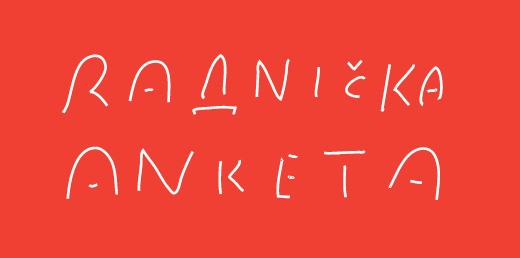On the precarious working conditions of cultural workers in Serbia – Workers’ Inquiry
Bojana Piškur, a member of the Radical Education Collective and curator in Moderna galerija, in Ljubljana, and Djordje Balmazović, a member of the Škart Collective, Belgrade, conducted a joint research investigation Workers’ Inquiry, based on Marx’s Workers’ Inquiry and concerning the position of cultural workers in Serbia. The research took place in Belgrade and Novi Sad in September 2012.
You can download the PDF of the publication from here in English:
http://radical.temp.si/wp-content/uploads/2013/01/Workers-Inquiry_English.pdf
and from here PDF in Serbian:
http://radical.temp.si/wp-content/uploads/2013/01/RADN-ANK-.pdf
Workers’ Inquiry is a 100-question research methodology that can be conducted in different formats, either as oral interviews or written narratives. It also serves as a kind of self-emancipation tool in the spirit of Marx, who said that the emancipation of the workers must come from the workers themselves. The questions range from the educational background, work experience, social and health benefits, participation in trade unions or political parties, to one’s working and living conditions. The aim of the investigation was to show the modes and different levels of exploitation of cultural workers. It is part of a larger project, a team effort to document and analyze the position of cultural workers in Serbia.
Twelve people actively involved in the cultural scene in Serbia were interviewed; curators, artists and activists from the independent and public sectors: Dario Milenković (Alternative Cultural Centre Niš and ACO (Alternative Cultural Organization) Novi Sad), Marko Miletić (Kontekst Collective), Nebojša Milikić (Cultural Centre REX), Radmila Krstajić (b. Joksimović) (independent curator), Aleksandra Sekulić (Center for Cultural Decontamination), Jelena Vesić (independent curator), Vladan Jeremić (artist, cultural and political worker), Rena Raedle (artist, cultural and educational worker), Zoran Erić (curator, Museum of Contemporary Art, Belgrade), Zoran Pantelić (artist and activist, kuda.org, Novi Sad), Marija Raletić (part-time worker at the Museum of Yugoslav History, Belgrade), Saša Pančić (independent artist).
The research investigation Workers’ Inquiry (Radical Education Collective & Škart) is right now in Graz part of the Kontekst collective attempt to conceptualize and realize the exhibition “Unexpected Encounters” in the frame of Steirischer Herbst 2013 in a collaborative process.
More info you can find here:
http://camera-austria.at/ausstellungen/unexpected-encounters/
 “Unexpected Encounters”, building on questions posed in the 2012 project “Art is Concrete”, focuses on the moment after the uprising: its starting point is the occurrence of and return to a normal state of life following upheaval. The collective desire for normality gives rise to new myths of order, institutions, history and identity. A number of initiatives and groups from various countries that underwent revolutions and political / societal upheaval – in some instances dating back twenty years or more – are invited to collaborate with Camera Austria in creating contributions that reflect and explore these phenomena. How can the indiscernible nuances of these political transformations be transmitted into the realm of cultural spaces without reducing them? How can artistic practice serve as a means of translating the complex political, institutional and social resistances into material forms?
“Unexpected Encounters”, building on questions posed in the 2012 project “Art is Concrete”, focuses on the moment after the uprising: its starting point is the occurrence of and return to a normal state of life following upheaval. The collective desire for normality gives rise to new myths of order, institutions, history and identity. A number of initiatives and groups from various countries that underwent revolutions and political / societal upheaval – in some instances dating back twenty years or more – are invited to collaborate with Camera Austria in creating contributions that reflect and explore these phenomena. How can the indiscernible nuances of these political transformations be transmitted into the realm of cultural spaces without reducing them? How can artistic practice serve as a means of translating the complex political, institutional and social resistances into material forms?
In the scope of the project “Unexpected Encounters” several initiatives / groups / collectives from various geographical locations were invited to discuss these questions and translate them into a presentation in the exhibition space: 0gms from Sofia, Beirut from Cairo, and Kontekst collective from Belgrade. The exhibition title alludes to the idea that even the probing of the respective societal situation itself may initially be marked by misjudgements, inappropriate assumptions, and dubious cultural differences. In a collaborative process, these groups and other artists were invited to explore how these political issues might be transferred into the realm of cultural production without replacing political aspects with cultural ones and thus making them disappear.

Trackbacks